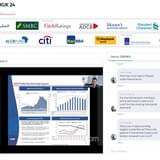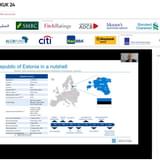The Turkish Central Bank last week cut its key overnight lending rate by 25bp, from 8.50% to 8.25%. The country’s Central Bank has now cut this rate for the past seven consecutive months.
According to Schildershoven Finance, the Central Bank governor has Murat Cetinkaya has delivered policy action that is in the government’s interests. There is growing concern over the independence of the Turkish Central Bank, with the country’s President Recep Tayyip Erdoğan having applied public pressure to cut rates in the past.
“As a fixed income investor in Turkey I would be cautious as I think there are upside risks to inflation in the country,” said a senior EM credit analyst, adding that the lack of a fully independent central bank in Turkey will likely come back to haunt them.
“Turkey and Russia are two very similar examples, but have central banks with differing degrees of independence. On a relative basis it is interesting from an investor point of view.”
Russia is certainly popular with international investors. The country issued US$1.25bn at 4.75% in a tap of its 2026 notes, following the Fed’s decision to keep rates on hold on last Wednesday, for which demand reached over US$7.5bn according to Reuters.
“There are far too many variables and factors that affect the complexity of such a dynamic,” said Daniel Moreno, senior portfolio manager of EM debt at Rubrics Asset Management, adding that the political climate is just one of many factors taken into account.
“Another factor is that inflation has been persistently high in Turkey for a number of years, whilst in Russia it has been more of a temporary shock.”
Although inflation in Russia reached 15.7% in October last year, it has since fallen to 6.9%. In Turkey meanwhile, inflation has fluctuated between 7-9% over the same period, and is currently trending around 8.05%.
Despite persistently high inflation however, the Turkish Central Bank still has room to manoeuvre around external shocks, albeit slightly less room than other central banks.
“The currency also remains weak against the euro and dollar, so from a fiscal point of view, the country does have a number of tailwinds, but the problem lies in the political uncertainty.”
The Turkish lira currently stands at 2.9887 to the US dollar.
“At the moment, conditions are quite benign, and it is quite easy to overlook the lack of independence at a central bank, but if there is an external shock and the central bank needs to act, that is where we will see the real test. This is where we will see a more significant reaction in the Turkish markets than in Russia for example because investors are more confident that the Russian Central Bank will act with more prudence than the Turkish Central Bank, which will be under immense pressure not to raise rates and react,” said the EM credit analyst.
Rating Cut To Junk
Although investor concerns over the ability of the Turkish Central Bank to react to external factors could lead them to be cautious in investing in the country, the country’s downgrade to junk status could block them from providing funds in any case.
Moody’s on Friday took their long awaited post-coup rating action, lowering the country’s long-term issuer and senior unsecured bond rating from Baa3 to Ba1 with a stable outlook, citing increased risks to Turkey’s external funding requirements and a weakening in previously supportive credit fundamentals.
The move caused a shift in the Turkish markets: 10-year government bond yields rose from 9.3% to 9.720% at present on Monday. The lira fell from 2.9689 against the dollar on Friday to 2.9887 the same day.
The downgrade to junk means Turkey could be cut off from many investors – both Moody’s and S&P Global Ratings now have Turkey in junk status (the latter at BB negative), with only Fitch keeping the country just inside IG at BBB- negative.
A junk rating from two of the main ratings agencies will block many IG investors from the country.
JP Morgan in August noted that a downgrade could drive forced selling of US$8.7bn in Turkish bonds.
However Jan Dehn, head of research at Ashmore noted that there will be a few billion dollars of outflows across the dollar bond complex.
“This alone will not support a sustainable a sell-off. Locals will buy. Real money will take advance of forced selling by ratings constrained investors. The ratings change itself is therefore neither going to be sustained nor significant beyond the near-term.”
He added that there will likely be around US$3bn worth of outflows, mostly forced, and that outflows from investors that have the option to remain will be limited.
With certain investors barred by the ratings action from Turkey, a number of other EMs could see these funds move into their assets, with Indonesia, South Africa, Mex, Brazil and Russia all likely to benefit from Turkey’s junk downgrade.
However, Dehn noted that the most attractive opportunity following the downgrade would be Turkey itself. “Investors can now buy the country’s assets cheaper than before, only because a ratings agency got negative,” he said, adding that at worst Turkey would see a 10bp premium.
Despite the downgrade, the rating action does not speak to the country’s economic fundamentals.
“A rating review will be on political aspects rather than economic ones, as the source of Moody’s rating review was a political factor. Turkey’s economic fundamentals are relatively strong; it is the political factors that are at play,” argued Moreno.
“There is political tension between the US and Turkey on involvement in Syria. We have to bear in mind that the main ratings agencies are all US. Russia was downgraded to junk two years ago arguably on political factors, but these agencies now have to acknowledge the strength of the debt dynamics of the Russian government and certain institutions,” he added.
Dehn stated that although Turkey is a slowly deteriorating credit due to weak macroeconomic management, it retains a number of important strengths, including low debt and decent fiscal indicators. Turkish government debt to GDP amounted to 32.90% in 2015.









